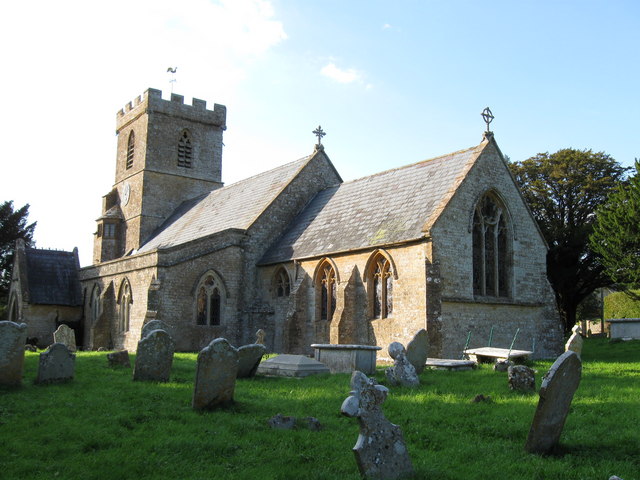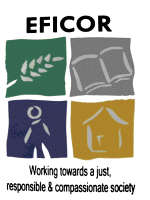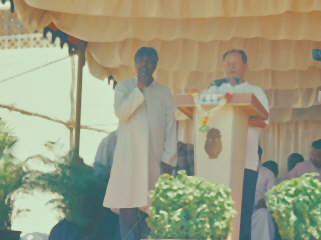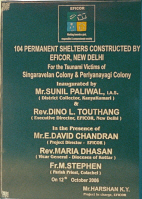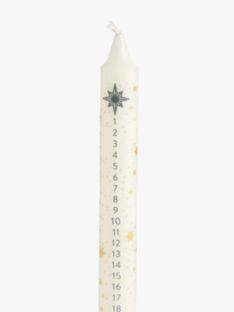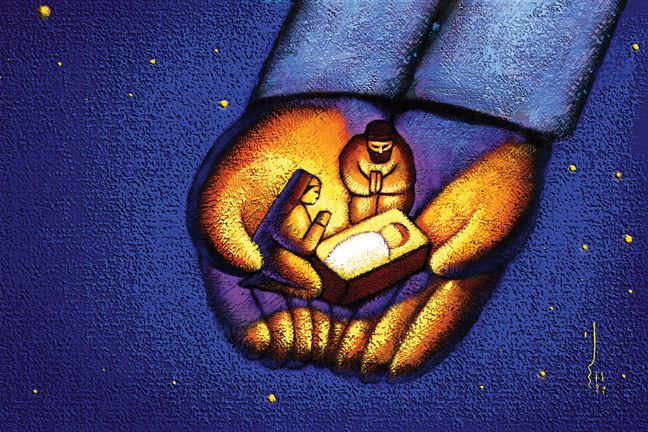Sermon for St Peter’s, Bramley, Leeds, 5 December 2021 (Advent 2)
Readings: Ruth chapter 2; Luke 3:1-6
Come with me to an event I attended in India several years ago. The Christian charity EFICOR had built a whole new village, Singaravelan, to replace one that had been swept away in the tsunami of Boxing Day 2004. On this day, the new houses were being officially handed over. There were garlands and decorations everywhere, a smartly dressed youth band to lead the procession, and a stage set up for speeches. Dignitaries included the District Collector, senior clergy, Directors of the charity and village leaders. Some spoke in Malayalam but the Director spoke in English. He told the community to cherish and maintain their new houses, to build families in joy and peace. Then came the punchline. “I want this to be a village where husbands no longer beat their wives …(dramatic pause) … and where wives no longer beat their husbands”.
Everyone
laughed, but it was a serious point to make.
Would he have spoken of people beating their partners if that had not
been going on before? He wanted this new
village to be a place where families would make a new start, free from
violence. And that’s the theme of our
service today, as part of the annual worldwide campaign against gender-based
violence.
In our
reading from the book of Ruth, she is working in the fields, not as a paid
farmworker, but as Jewish law allowed, a poor person picking up any bits of grain
that the reapers had missed. Boaz, the farmer, was a relative of her
mother-in-law, and knew he had to protect her from harm as part of the
family. So he says, “I have ordered the
young men not to bother you.” Again, at
the end of the day, Naomi says, “It is better that you go out with Boaz’s young
women, otherwise you might be bothered in another field”. ‘Bothered’ is translated in some Bible
versions as ‘molested’. Just as in
India, would they have mentioned this unless it was common for the men in the
fields to molest the women?
Israel
around 1000 B.C. India in 2006. These things happened long ago, or in poor
communities far away. But they don’t
happen here and now, do they. Do
they? Here’s the story of one married
woman from the charity Refuge. They call
her Isobel.
When I met my ex-husband, I had my own business, my own flat, supportive friends and family. I was confident and self-assured and independent. Domestic violence was not something I ever thought would happen to me.
He was controlling from the beginning. I was constantly walking on eggshells. I was undermined and humiliated in a million different ways. But whenever I tried to leave, he would reel me back in, telling me that he would change and that he wanted us to be a family. One day a normal conversation suddenly turned into a frenzied attack. He punched me to the ground, kicked me in the back, and then threw me across the room – all in front of our two children. I called the police, and eventually they put me in touch with Refuge.
One of Refuge’s outreach workers,
Anna, began supporting me. We talked about everything I had been through and
she helped me to understand that Ben’s behaviour was a deliberate pattern of
control. It was not my fault.
Now things are so much better. It
isn’t easy to break away from a violent partner; I don’t think I could have
done it without Refuge’s support. Refuge saved my life.
Charities like Refuge tell us that one in three women in Britain today will experience violence or controlling behaviour at some time in their lives. The chances are, several of you here today will have suffered in this way. The offender might be a boy at school, a stranger in a dark street or a work colleague. But more often it happens at home: a father, brother, boyfriend or husband. And of course as the Indian charity director’s speech reminds us, it can be the other way round – sometimes it is a woman who is violent to her partner. Ruth was lucky, she was the boss’s young relative and he made sure she was left alone. But most of us aren’t so lucky.
In this Advent season, the theme of our readings and prayers is around asking Jesus to come and put problems right, to take back control of this broken world. That’s what John the Baptist meant when he prophesied that Jesus was about to appear, quoting an older prophesy of valleys and mountains being levelled up. We might understand that applied to personal relationships as saying that those who have a natural advantage, those who are physically stronger or have the power in a relationship, will be brought down, and those who are weaker or feel themselves trapped in the bottom of a valley will be lifted up and set on their feet. The crooked – the crooks of this world – will be brought to justice and helped to ‘go straight’ as we say.
Also in the
reading from Ruth, Boaz says this to Ruth: “May you have a full reward from the
Lord, the God of Israel, under whose wings you have come for refuge”. That
image of God as a bird, perhaps a mother hen, protecting her chicks under her
wing, is one that Jesus used as well.
God is on the side of the victim.
He hears their cries, offers protection from harm, lifts up the
downfallen and deals with the offender.
But as we are often reminded, Christ has no hands but ours. Boaz in the Bible story is called Ruth’s ‘Redeemer’, the same title we give to Christ, and it carries the sense of offering protection. As Christ’s body on earth, it is we who are given the task of carrying out that ministry of redemption in practice. And as Jesus also said, much is expected of those to whom much has been given. The powerful person, the head of the household, has a particular responsibility to protect those in their care from harm. The challenge for us, particularly us men, is to be the protector of the women in our lives, not to dominate them.
But those who have been harmed do need support as well. In our next hymn we will ask God to provide “Refuge from cruel wars, havens from fear, cities for sanctuary, freedoms to share”. It is often Christians who volunteer to offer counselling, work for the police or probation service, run refuges for women fleeing violence, or just keep an eye out for neighbours. In our prayers today you may wish to name someone silently to God and ask him to show you how you can help in setting them free.
A last word: we do of course have safeguarding policies in the church, and if you see or hear anything that concerns you, please have a word with the Vicar or safeguarding officer. And if you yourself are that person in the bottom of the valley, feeling that there is no way out, or if anything else you have heard today disturbs you, again, have a word in confidence with one of them. God’s protecting wing is here, our Redeemer is among us.
